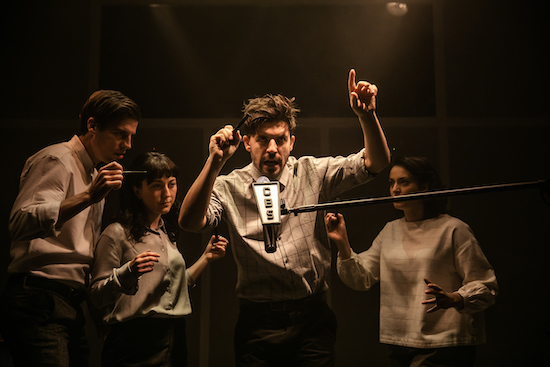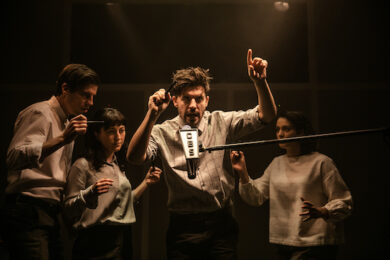“No one would have believed in the last years of the nineteenth century that this world was being watched keenly and closely by intelligences greater than man’s…” Everyone knows The War of Worlds, but what is it that they know? Is it H.G. Wells original 1898 book? Is it the 1978 Jeff Wayne musical, narrated by the great Richard Burton? Either of the two film adaptations perhaps, in 1953 and 2005, the latter by Steven Spielberg. Or is it the infamous Orson Welles radio dramatisation, broadcast in the US on 30 October, 1937?
Rhum and Clay take the latter as a starting point for their examination of our era of disinformation and fake news. The Welles broadcast quickly gained a legendary status with only tenuous links to reality. Supposedly, many Americans were fooled by the documentary nature of the drama, which featured interviews with correspondents in the field that cut out suddenly as the Martians descended with their heat rays. A mass panic is said to have ensued, with people fleeing the alien invaders along the East Coast, believing a real alien invasion was underway.
Set in a radio studio, Rhum and Clay’s The War of the Worlds begins with a recreation of Welles’ broadcast featuring four pipe-wielding Orsons. The dramatic techniques he used – interrupting music programmes for news flashes, puzzlement and confusion overtaking the presenters as events appear to spiral out of control – are surprisingly effective. But can they really have had the impact reported in urban lore? The radio was relatively new, the most powerful communication medium in the world, but how can a box sitting in the corner of the living room, pumping out stories have such an impact on real lives? A clear metaphor for the impact of the internet on our era, the evolution of War of the Worlds from pioneering sci fi novel to nebulous truth was new then, but is now the kind of story we hear every day.
Isley Lynn’s script introduces a modern storyline, a young woman (Meena) who seizes on her neighbour John’s family drama as an excuse to make a podcast, and travels to the fictional Martian landing site at Grover’s Mill, New Jersey, to investigate. The town, visited by Rhum & Clay’s Julian Spooner for the show, has become a cynical, tourist-themed attraction with alleged ‘attractions’ and a War of the Worlds Diner, where jaded staff offer a ‘death ray’ experience. The fiction has become reality, with an eerie smoothness, casting a malign influence magnified by the many layers of myth-making that have intervened in the 80 years since Welles.
The show moves to 2016, during the US election campaign. Meena investigates the story that John’s grandmother was abandoned by her parents, who fled after the Welles’ broadcast, choosing her sister over her. She is drawn into a small, tense family of John’s relatives, whose vaping, socially awkward son Jonathan writes fake news in his bedroom that is fuelling the Trump campaign. He sees no moral difficulty in inventing the stories he posts, claiming to respond directly to demand by providing what the public wants: lizard people, and Hilary meeting paedophiles. He says “It’s not my job to stop giving them what they want. It’s their job to stop wanting it.”
The War of the Worlds is staged with energy and verve, and its four performers keep the audience constantly engaged. The set – sound-proofed studio walls, with the lighting control box visible throughout where the studio control room would be – is simple, but well-suited to the physical inventiveness on display. Rhum and Clay’s artistic directors Matthew Wells and Julian Spooner play the male parts, and engage in occasional scene stealing, including as a pair of bottom-sniffing dogs belonging to a lady in a Grover’s Mill park. The female roles belong to Mona Goodwin and Amalia Vitale, whose joint impersonation of two panicked citizens trying to buy poison pills ahead of the Martian landing before settling for getting drunk instead, is a mini-highlight.
It is hard to fault the performers, who switch between an impressive, sometimes dazzling range of characters, eras and settings with apparent ease. However, the 2016 storyline seems contrived. Meena’s character provides an opportunity for a dig at entitled amateur journalists, and her attempts to record a cliffhanging, Serial-esque podcast are both funny and a strong reflection on how access to universal broadcasting has made the issues first highlighted by the reaction to Welles’ broadcast the world’s number one cultural concern. However, she is too much of caricature to carry the family drama that unreels towards the end of the evening. Similarly, Jonathan is a type who illustrates the fascinating and disturbing fake news phenomenon, but it is hard to care that much about his relationship with his parents.
Amalia Vitale, playing his mother Lawson, has the most developed character, and is able to make the most of it – a believable New Jersey mother who switches between hospitable to hard-nosed to vulnerable within a few lines. Her performance is particularly impressive. The War of the Worlds though, does not quite pull it off and loses its way as it tries to wrap up both drama and argument. The ending, with lost family members reconnecting on Skype, veers into triteness – which is a shame, because the rest of the show has been thought through on a deeper level. Rhum & Clay have deep reserves of talent and imagination, and their work is always worth watching. The War of the Worlds is a flawed but intriguing show, lacking coherence but full of invention. The endurance of the myth unleashed by Welles in 1937, showing clearly how the truth does not matter, only the story. The show’s final line, “Are you recording me?”, could be a motto for our crackpot, soapbox times.
War of the Worlds is at the New Diorama Theatre, London until 9 February



